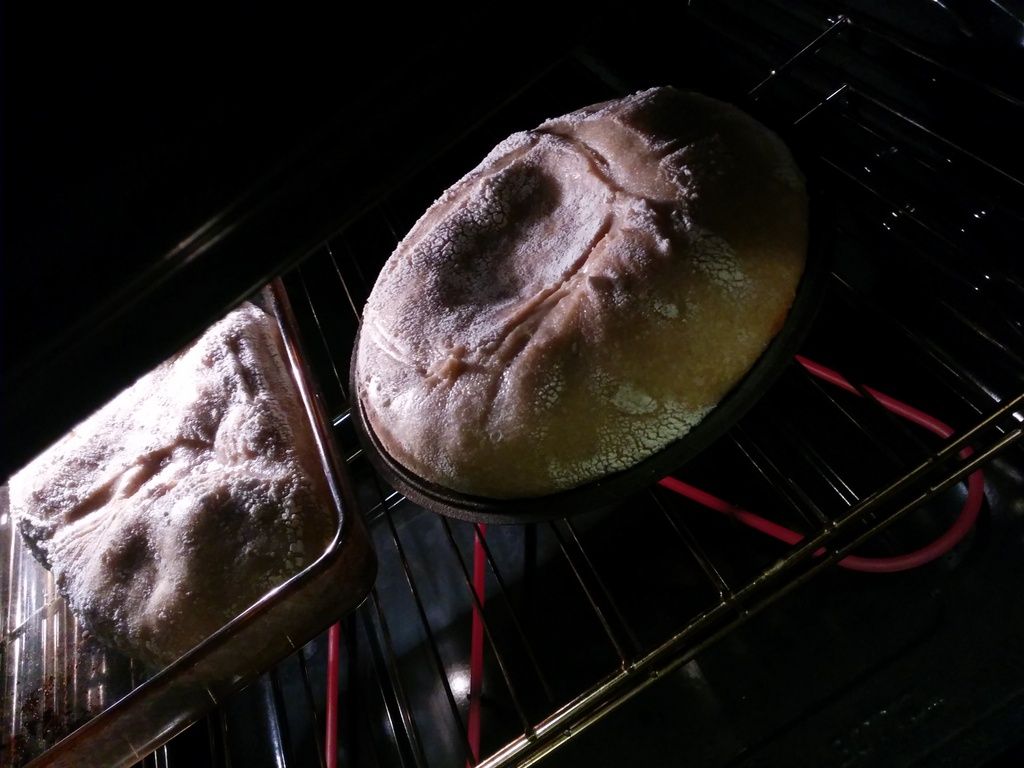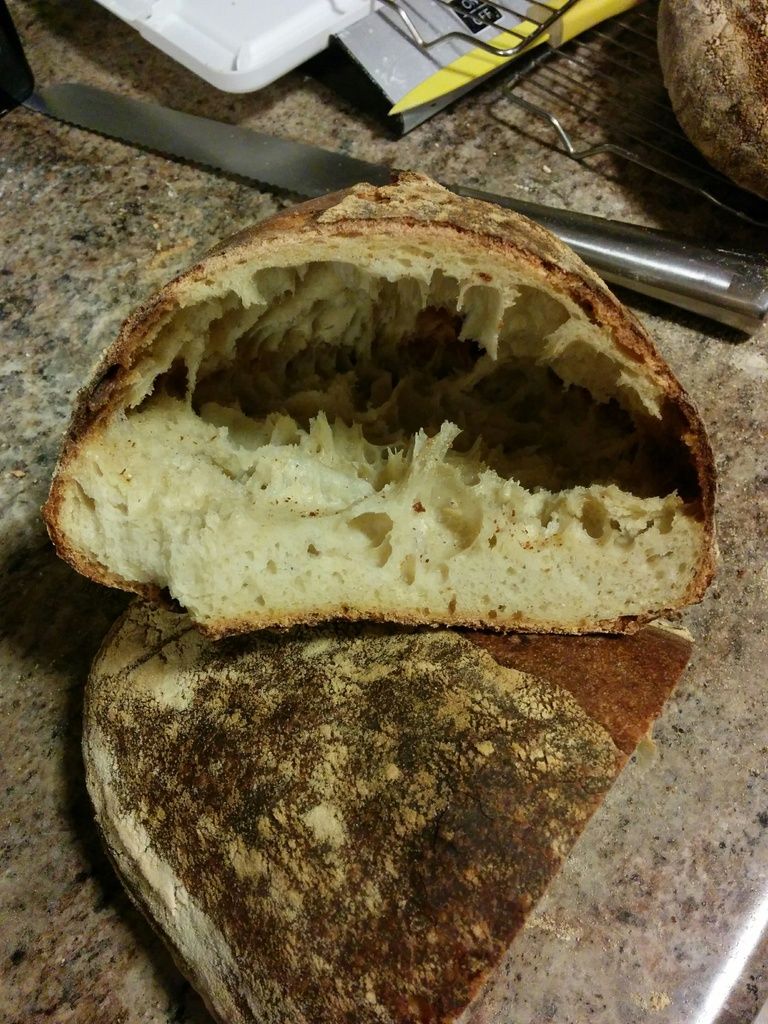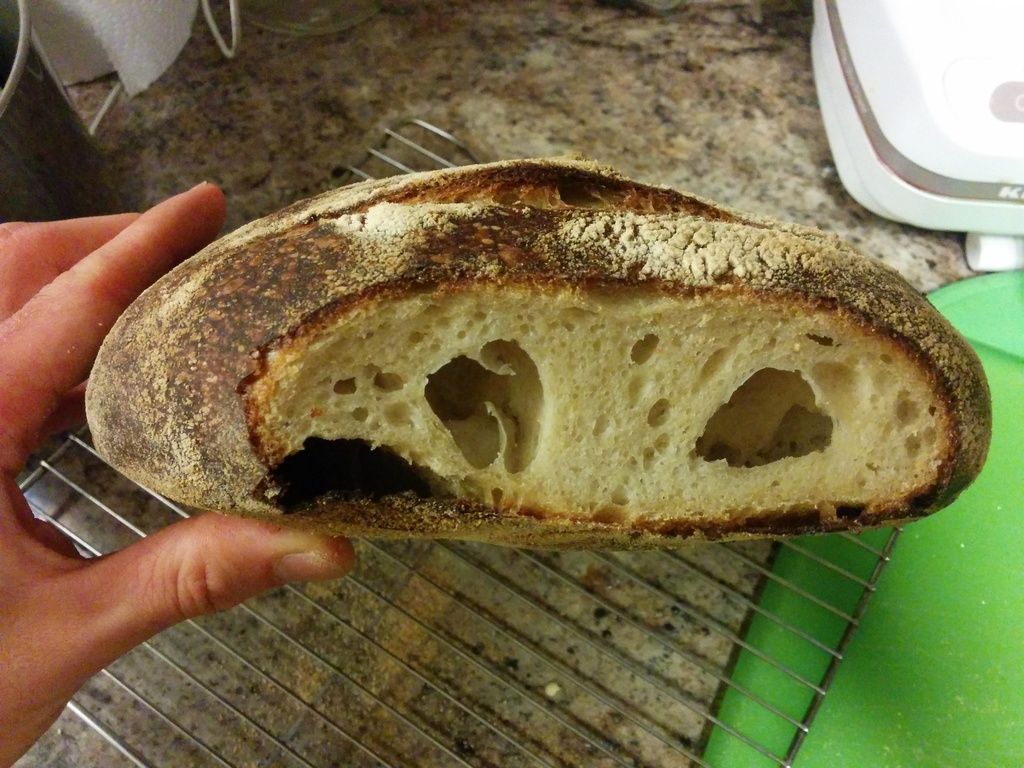Hi there,
I have been making sourdough for quite a while now and have had some spectacular results, but recently things just have not been working out and I cannot figure out why.
I'm generally using the Tartine basic country loaf recipe which has worked great before.
Starter: 200g 50:50 white:whole wheat, 100% hydration (though I have used others)
Recipe: 900g white (Fairhaven Mill, 10% protein) + 100g King Arthur Organic whole wheat, hydration: 75 - 80%, 15g salt.
I normally use a 5 - 20% inoculation of starter and use it when a teaspoon of it is just able to float in water. I generally mix the dough then leave for 30 mins before adding the salt with a little extra water. Then I stretch and fold about once every 30 - 40 mins for 2 - 4 hours, after which I divide in two. I do an initial shaping and bench rest for 30 mins then final shape and put in a proofing again for between 2 and 4 hours or longer in the fridge. I try to use the poke test on the dough to get an idea of whether it's ready or not. I bake in a cast iron pan or some improvised equivalent, but the problem seems to occur before the bake.
I feel like I have tried systematically varying a ton of stuff to no avail: using a more or less mature starter, shortening and lengthening the time taken for each stage, reducing and increasing the amount of manipulation, different starters, refrigerating, more or less shaping...
Problems range from totally collapsing, losing shape, or splitting into regions of very large holes surrounded by dense crumb.
Any thoughts would be welcome!



...and your bulk ferment varies from 2-4 hours. Well firstly 5-10% starter does not fit into this timescale at all. 20% at 4 hours can be done but even so it might not always be the case. If your starter is strong enough and the conditions good enough then that should be fine for 20% but non of your timing fits less starter.
If your starter floats then it should be ready.
I think your timing is off and the bulk ferment isn't done properly.
... that I use to build the levain. So I take around 10 to 40g of starter and mix that with 100g flour and 100ml water. I then wait until the levain can float, take 200g of it and use that for the dough. This is the 20% I guess you're talking about?
It does sound like maybe I'm rushing it a bit. However I'd always put a collapsing loaf down to overproofing before.
I thought you meant you used anything between 5-20% starter in your dough.
If you use 200g starter for 900g flour that makes it 22% starter which puts your bulk ferment within a good time margin.
make a gauge to judge your rises. Also watch those dough temperatures and fluctuation.
A gauge can easily be made with a small straight sided jar. Tear off a walnut sized ball of dough after kneading and stuff it into the bottom of the jar... mark the level and 1/3 , 1/2, x2, and keep it beside your dough thru all the phases. When doing the folds, just let the gauge dough rise until it peaks so you can compare the amount of rise it would have if not folded. When chilling, push it down with the end of a wooden spoon if high and chill side by side. That might give some insight in watching the gas forming inside the dough.
Make sure the starter is up to snuff. A dense crumb surrounded by large bubbles often but not always indicates the starter or the bulk needed more time to get the yeast population up. Look closely at the crumb between the large bubbles, what shapes are the bubbles? A large "baker's bedroom" is often over-proofing. Since you are using a small about of salt, get it in earlier if you can to help regulate the fermentation. If your temps have dropped, you might find yourself increasing the inoculation to keep the sourdough starter in the recipe on the same time schedule. A few degrees makes a big difference in timing if you're watching the clock. Cold water, colder flour, all influence the fermenting times.
I would go find one of those tall skinny olive jars and make a gauge, run some tape up the side (for easy transfer to a notebook) and get a little bit scientific about problem solving notes. Be sure to date and include temps. :)
I have done some things like that before when I first got started with my starter, but not on the actual dough.
I think the starter is up to the job, but maybe it does need a little more time. Good tip on the salt. Do you think that the protein content of the flour is playing a role here too?
I'm sure it does. Low protein flours tend to fall apart with long, long sourdough fermentations and retards. That's what bread flour is for and you might want to look for some stronger wheat flour, repeat the same recipe as is but use bread flour and see what differences it makes. I don't use bread flour on short fermentations, AP works just fine but beyond a day... and there is all that active Whole wheat in there, yes, protein content will make a difference.
I'm intrigued by your suggestion to make a gauge to judge the rise. I've never done this, but i'd like to try because i'm not great at eye balling the rise in my dough.
I'm just trying to figure out why a walnut sized piece of dough won't rise (and then become "over proofed") faster than the rest of the dough? Won't the middle of the small piece of dough get warmer faster the rest of the dough?
What am I missing?
Thanks in advance!
might get colder north of the "ice line." It's only a simple gauge and kept close to the bowl of dough, could even sit in the bowl with the dough. Bowls are such horrible shapes for eyeballing but can hold a lot of volume. Now if you are in the tropics and the air is warmer than the dough, you just might have a gauge that ferments faster than the loaf dough but it won't be by much.
More often than not, the loaf dough will be warmer and retain its heat longer. Simply due to its mass.
I'm intrigued by your suggestion to make a gauge to judge the rise. I've never done this, but i'd like to try because i'm not great at eye balling the rise in my dough.
I'm just trying to figure out why a walnut sized piece of dough won't rise (and then become "over proofed") faster than the rest of the dough? Won't the middle of the small piece of dough get warmer faster the rest of the dough?
What am I missing?
Thanks in advance!
Using a piece of dough in a jar as a gauge during the bulk fermentation worked a treat.
After 6 hours at (fairly cold) room temperature the gauge showed around a 40% increase in volume and the dough had become nicely aerated. I decided to shape at this point and then after a 16 hour proof in the fridge I baked and got two brilliant loaves.
I'm going to keep doing this for a while to see the effects of different variables.